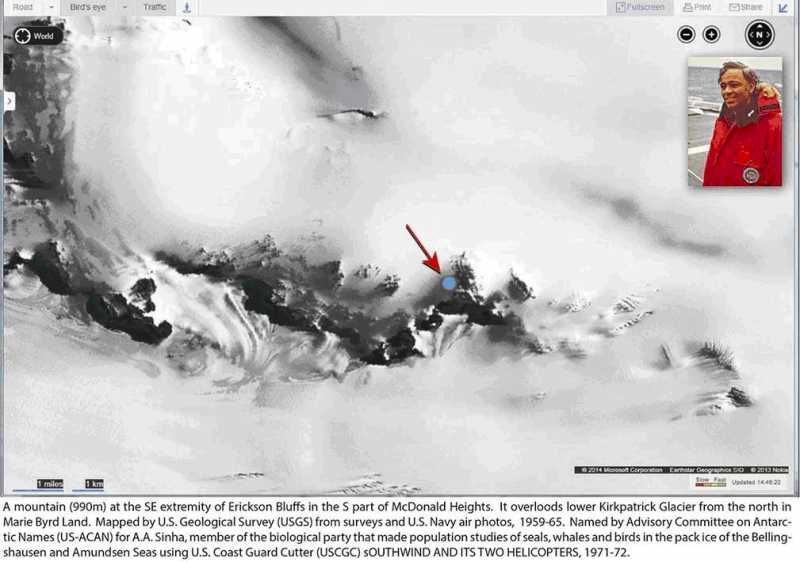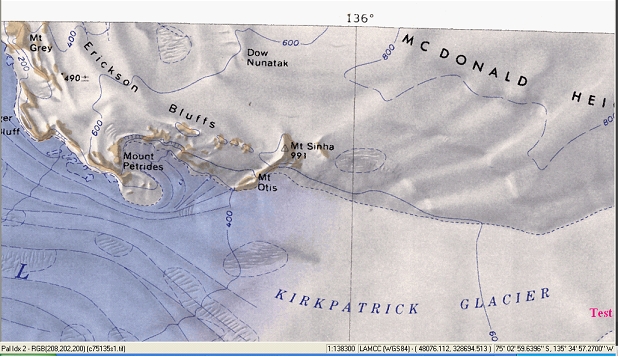Arun Kumar writes about Akhouri Sinha, an Indian-American research scientist, was looking for some information to write a few words on the death of his team leader on an expedition to Antarctica in the seventies. To his surprise, he found a Wikipedia entry dated May 17, 2012, saying a 990-metre high mountain at the southeast extremity of Erickson Bluffs in the south part of McDonald Heights had been named Mt. Sinha after him.

Back in November, Akhouri Sinha, an Indian-American research scientist, was looking for some information to write a few words on the death of his team leader on an expedition to Antarctica in the seventies. To his surprise, he found a Wikipedia entry dated May 17, 2012, saying a 990-metre high mountain at the southeast extremity of Erickson Bluffs in the south part of McDonald Heights had been named Mt. Sinha after him.
Overlooking lower Kirkpatrick Glacier from the north in Marie Byrd Land, it was “mapped by United States Geological Survey (USGS) from surveys and US Navy air photos, 1959-65.
“Named by Advisory Committee on Antarctic Names (US-ACAN) for A.A. Sinha, member of the biological party that made population studies of seals, whales and birds in the pack ice of the Bellingshausen and Amundsen Seas using USCGC Southwind and its two helicopters, 1971-72,” the entry read.
Sinha, who is a research scientist at the Veterans Affairs Medical Centre in Minneapolis, Minnesota, and adjunct Professor in the Department of Genetics, Cell Biology and Development and a professor in the Department of Urology at the University of Minnesota, still does not know “the exact date or year when Mount Sinha was named.”
Born in Churamanpur village near Buxar, Bihar, Sinha, “trained as a reproductive biologist (was) working on the reproduction of sea otter, and many animals before I moved to Minnesota.”
“After I moved to VA, I was nudged to work something relevant to veterans’ diseases,” Sinha told IANS in an email interview. Currently, he is working on human prostate cancer.
Sinha, who has been invited as the main speaker for the 9th International Conference of Anticancer Research to be held in Greece in October 2014, said: “This is a great honor for an immigrant scientist who has brought a good name to India by his work in the USA.”
Sinha, who has a BSc degree from Allahabad University and an MSc degree in Zoology from Patna University, taught in the Department of Zoology at the Ranchi College before coming to the US in 1961 to do his PhD at the University of Missouri at Columbia.
He has published over 100 papers while teaching graduate level courses for almost 25 years.
“Akhourys have lived in the village of Churamanpur which was established in 1739 by my forefather, Akhoury Churaman Singha (now Sinha),” he said.
“I go to my village almost every year, preferably in February to escape Minnesota winter and to visit relatives and village friends and others,” Sinha said. I speak Bhojpuri at home and with everyone in my village and surrounding areas.”
“In spite of my stay in the US, I have preserved my perspectives in life,” he said advising Indians “to work smart.”
“Earning money is not enough. I know many Indians brag how rich they are. One cannot take money with you, but a good deed will last for ever.”
“Be yourself, you will be happy,” Sinha said. “That is the message I will give to Indians and for that matters Americans as well.”